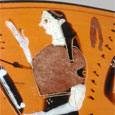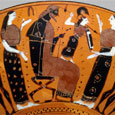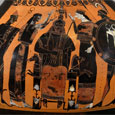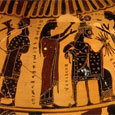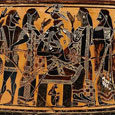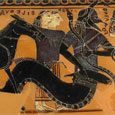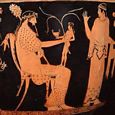EILEITHYIA
Greek Name
Ειλειθυια
Transliteration
Eileithyia, Ilithyia
Roman Name
Lucina, Natio
Translation
Relieve (elêluthyia)
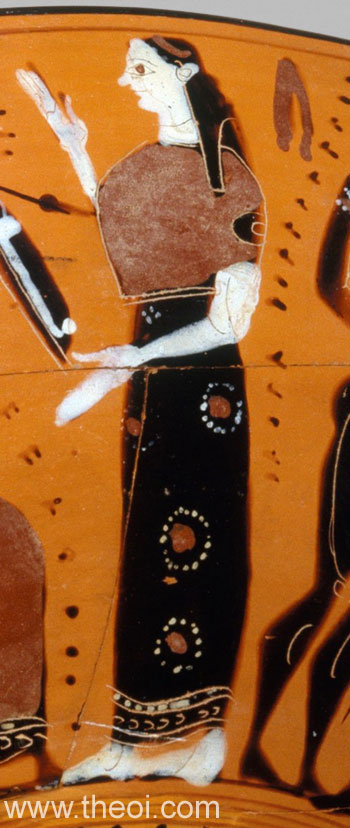
EILEITHYIA (Ilithyia) was the goddess of childbirth and labour pains. According to some there were two Eileithyiai (Eileithyiae)--one who furthered birth and one who protracted the labour. Her name means "she who comes to aid" or "relieve" from the Greek word elêluthyia. Her Roman counterpart was Lucina ("Light bringer") or Natio ("Birth").
When Alkmene (Alcmena) was in labour with Herakles (Heracles), Hera sent Eileithyia to stay the birth and so kill mother and child. However, Alkmene's handmaiden Galinthias spied the goddess seated before the door with her arms and legs crossed, and cried "a son is born." The goddess leapt up in surprise, releasing her magical grip on the womb, allowing the child to be born. Eileithyia was furious at being tricked by the woman and transformed Galinthias into a polecat.
Eileithyia was depicted as a woman wielding a torch, representing the burning pains of childbirth, or with her arms raised in the air to bring the child to the light. She was closely identified with the goddesses Hera and Artemis, both of whom bore epithets of her name.
FAMILY OF EILEITHYIA
PARENTS
[1.1] ZEUS & HERA (Hesiod Theogony 921, Apollodorus 1.13)
[1.2] HERA (Homer Iliad 11.270, Pindar Nemean Ode
7, Pausanias 1.18.5, Diodorus Siculus 4.9.4, Aelian On Animals 7.15, Nonnus Dionysiaca 48.794)
OFFSPRING
[1.1] SOSIPOLIS (Pausanias 6.20.2)
[2.1] EROS (Pausanias 9.27.2)
ENCYCLOPEDIA
EILEITHYIA (Eileithuia), also called Eleithyia, Eilethyia, or Eleutho. The ancients derive her name from the verb eleuthein, according to which it would signify the coming or helping goddess. She was the goddess of birth, who came to the assistance of women in labour; and when she was kindly disposed, she furthered the birth, but when she was angry, she protracted the labour and delayed the birth. These two functions were originally assigned to different Eileithuiai. (Hom. Il. xi. 270 xvi. 187, xix. 103; comp. Paus. i. 44. § 3; Hesych. s. v. Eileithuiai.) Subsequently, however, both functions were attributed to one divinity, and even in the later Homeric poems the Cretan Eileithyia alone is mentioned. (Hom. Hymn. in Apoll. Del. 98, &c., Od. xix. 188.) According to the Iliad the Eileithyiae were daughters of Hera, the goddess of marriage, whom they obeyed. (Hom. Il. xix. 119; comp. Pind. Nem. vii. init.; Ov. Met. ix. 285, &c.; Anton. Lib. 29.) According to Hesiod (Theog. 922) Zeus was the father of Eileithyia, and she was the sister of Hebe and Ares. (Apollod. i. 3. § 1.) Artemis and Eileithyia were originally very different divinities, but there were still some features in their characters which afterwards made them nearly identical. Artemis was believed to avert evil, and to protect what was young and tender, and sometimes she even assisted women in labour. Artemis, moreover, was, like Eileithyia, a maiden divinity; and although the latter was the daughter of the goddess of marriage and the divine midwife, neither husband, nor lover, nor children of her are mentioned. She punished want of chastity by increasing the pains at the birth of a child, and was therefore feared by maidens. (Theocrit. xxvii. 28.) Frequent births, too, were displeasing to her. In an ancient hymn attributed to Olen, which was sung in Delos, Eileithyia was called the mother of Eros. (Paus. i. 18. § 5. ix. 27. § 2.) Her worship appears to have been first established among the Dorians in Crete, where she was believed to have been born in a cave in the territory of Cnossus. From thence her worship spread over Delos and Attica. According to a Delian tradition, Eileithyia was not born in Crete, but had come to Delos from the Hyperboreans, for the purpose of assisting Leto. (Herod. iv. 35.) She had a sanctuary at Athens, containing three carved images of the goddess, which were covered all over down to the toes. Two were believed to have been presented by Phaedra, and the third to have been brought by Erysichthon from Delos. (Paus. i. 8. § 15.) Her statues, however, were not thus covered everywhere, as Pausanias asserts, for at Aegion there was one in which the head, hands, and feet were uncovered. (Paus. vii. 23. § 5.) She had sanctuaries in various places, such as Sparta (Paus. iii. 17. § 1, 14. § 6), Cleitor (viii. 21. § 2), Messene (iv. 31. § 7), Tegea (viii. 48. § 5), Megara (i. 44. § 3), Hermione (ii. 35. § 8), and other places. The Elionia, who was worshipped at Argos as the goddess of birth (Plut. Quaest. Rom. 49), was probably the same as Eileithyia.
Source: Dictionary of Greek and Roman Biography and Mythology.
ALTERNATE NAME SPELLINGS
The name Eileithyia had a number of distinctive forms in the various Greek dialects.
Greek Name
Ειλειθυια
Ελειθυα
Ειληθυια
Ελευθια
Transliteration
Eileithyia
Eleithya
Eilêthyia
Eleuthya
Latin Spelling
Ilithyia
Elithyia
Elethyia
Eleuthya
Translation
Relieving (elêluthyia)
id.
id.
id. (Ionian sp.)
Greek Name
Ελευσια
Ειλειθεια
Ελειυθυα
Ειλειονεια
Transliteration
Eleusia
Eileitheia
Eleiuthya
Eileioneia
Latin Spelling
Eleusia
Ilitheia
Eleiuthya
Ilioneia
Translation
id. (Ionian sp.)
id. (Boeotian sp.)
id. (Cretan sp.)
id.
CLASSICAL LITERATURE QUOTES
PARENTAGE OF EILEITHYIA
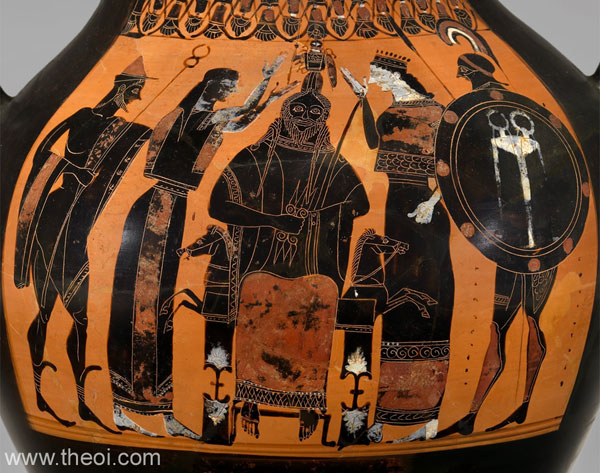
Homer, Iliad 11. 270 ff (trans. Lattimore) (Greek epic C8th B.C.) :
"The hard Eileithyiai (Eileithyiae, Spirits of Childbirth) . . . Hera's daughters, who hold the power of
the bitter birthpangs."
Homer, Odyssey 19. 188 ff (trans. Shewring) (Greek epic C8th B.C.) :
"He [Odysseus] anchored in Amnisos (Amnisus) [in Krete (Crete)], by the cave of Eileithyia."
[N.B. the goddess was reputedly born in this cave.]
Hesiod, Theogony 921 ff (trans. Evelyn-White) (Greek epic C8th or C7th B.C.)
:
"Lastly, he [Zeus] made Hera his blooming wife: and she was joined in love with the king of gods and men,
and brought forth Hebe and Ares and Eileithyia."
Pseudo-Apollodorus, Bibliotheca 1. 13 (trans. Aldrich) (Greek mythographer C2nd A.D.)
:
"Zeus married Hera and fathered Hebe, Eileithyia."
Pausanias, Description of Greece 8. 21. 3 (trans. Jones) (Greek travelogue C2nd A.D.)
:
"The Lykian (Lycian) Olen, and earlier poet, who composed for the Delians, among other hymns, one to
Eileithyia, styles her ‘the clever spinner’, clearly identifying her with fate, and makes her older
than Kronos (Cronus, Time)."
Pausanias, Description of Greece 1. 18. 5 :
"The Kretans (Cretans) suppose that Eileithyia was born at Amnisos in the Knossian (Cnossian) territory,
and that Hera was her mother."
Aelian, On Animals 7. 15 (trans. Scholfield) (Greek natural history C2nd A.D.)
:
"Ye Eileithyiai (Eileithyiae, Goddesses of Birth), daughters of Hera."
Pseudo-Hyginus, Preface (trans. Grant) (Roman mythographer C2nd A.D.) :
"Again from Jove [Zeus] and Juno [Hera] [were born]: Juventus (Youth) [Hebe], Libertas (Freedom)
[Eileithyia]."
Nonnus, Dionysiaca 8. 178 ff (trans. Rouse) (Greek epic C5th A.D.) :
"Now Hera left the shieldbeswingled cave of the Diktaian (Dictaean) rock [in Krete (Crete)] and the cavern
where the goddess of childbirth [Eileithyia] was born."
EILEITHYIA & THE BIRTH OF APOLLO
Homeric Hymn 3 to Delian Apollo 89 ff (trans. Evelyn-White) (Greek epic C7th - 4th
B.C.) :
"[The goddess Leto, pregnant with Apollon, went into labour on the island of Delos :]
Leto was racked nine days and nine nights with pangs beyond wont. And there were with her all the chiefest of
the goddesses, Dione and Rheia and Ikhnaia (Ichnaea) and Themis and loud-moaning Amphitrite and the other
deathless goddesses save white-armed Hera, who sat in the halls of cloud-gathering Zeus. Only Eileithyia,
goddess of sore travail, had not heard of Leto's trouble, for she sat on the top of Olympos (Olympus) beneath
golden clouds by white-armed Hera's contriving, who kept her close through envy, because Leto with the lovely
tresses was soon to bear a son faultless and strong.
But the goddesses sent out Iris from the well-set isle to bring Eileithyia, promising her a great necklace
strung with golden threads, nine cubits long. And they bade Iris call her aside from white-armed Hera, lest she
might afterwards turn her from coming with her words. When swift Iris, fleet of foot as the wind, had heard all
this, she set to run; and quickly finishing all the distance she came to the home of the gods, sheer Olympos,
and forthwith called Eileithyia out from the hall to the door and spoke winged words to her, telling her all as
the goddesses who dwell on Olympos had bidden her. So she moved the heart of Eileithyia in her dear breast; and
they went their way, like why wild-doves in their going. And as soon as Eileithyia the goddess of sore travail
(mogostokos) set foot on Delos, the pains of birth seized Leto, and she longed to bring forth; so she
cast her arms about a palm tree and kneeled on the soft meadow while the earth [of Delos] laughed for joy
beneath. Then the child leaped forth to the light."
Pausanias, Description of Greece 1. 18. 5 (trans. Jones) (Greek travelogue C2nd A.D.)
:
"Eileithyia they say came from the Hyperboreans to Delos and helped Leto in her labour; and from Delos the
name spread to other peoples."
EILEITHYIA, GALINTHIAS & THE BIRTH OF HERACLES
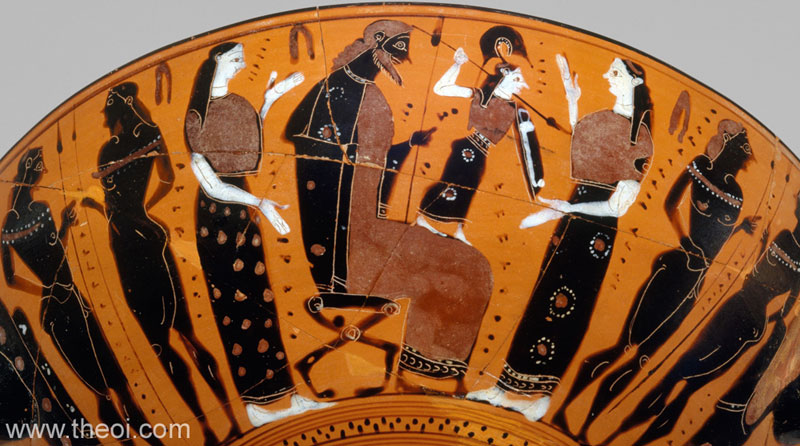
Homer, Iliad 19. 103 ff (trans. Lattimore) (Greek epic C8th B.C.) :
"Zeus spoke forth and made a vow before all the immortals : ‘Hear me, all you gods and all you
goddesses: hear me while I speak forth what the heart within my breast urges. This day Eiliethyia of women's
child-pains shall bring forth a man to the light who, among the men sprung of the generation of my blood, shall
be lord over all those dwelling about him.’ . . . But Hera in a flash of speed left the horn of Olympos .
. . and she brought him [Eurystheus] sooner into the light, and made him premature, and stayed the childbirth of
Alkmene (Alcmena) [who was pregnant with Herakles (Heracles)], and held back the birth pangs."
[N.B. Presumably Hera's daughter Eileithyia stayed the birth as in later versions of the story.]
Pseudo-Apollodorus, Bibliotheca 2. 53 (trans. Aldrich) (Greek mythographer C2nd A.D.)
:
"For when Herakles (Heracles) was about to be born, Zeus told the gods that the coming descendant of
Perseus would be king of Mykenai (Mycenae), so Hera in jealous spite persuaded Eileithyia to hold back Alkmene's
(Alcmena's) labor, and then arranged to have Sthenelos' (Sthenelus') son Eurystheus born in seven months."
Diodorus Siculus, Library of History 4. 9. 4 (trans. Oldfather) (Greek historian C1st
B.C.) :
"Zeus, whose mind was fixed upon the birth of Herakles (Heracles), announced in advance in the presence of
all the gods that it was his intention to make the child who should be born that day king over the descendants
of Perseus; whereupon Hera, who was filled with jealousy, using as her helper Eileithyia her daughter, checked
the birth-pains of Alkmene (Alcmena) and brought Eurystheus forth to the light before his full time."
Antoninus Liberalis, Metamorphoses 29 (trans. Celoria) (Greek mythographer C2nd A.D.)
:
"At Thebes Proitos (Proetus) had a daughter Galinthias. This maiden was playmate and companion of Alkmene
(Alcmena), daughter of Elektryon (Electryon). As the birth throes for Herakles (Heracles) were pressing on
Alkmene, the Moirai (Moirae, Fates) and Eileithyia (Birth-Goddess), as a favour to Hera, kept Alkmene in
continuous birth pangs.
They remained seated, each keeping their arms crossed. Galinthias, fearing that the pains of her labour would
drive Alkmene mad, ran to the Moirai and Eleithyia and announced that by desire of Zeus a boy had been born to
Alkmene and that their prerogatives had been abolished. At all this, consternation of course overcame the Moirai
and they immediately let go their arms. Alkmene's pangs ceased at once and Herakles was born. The Moirai were
aggrieved at this and took away the womanly parts of Galinthias since, being but a mortal, she had deceived the
gods. They turned her into a deceitful weasel, making her live in crannies and gave her a grotesque way of
mating. She is mounted through the ears and gives birth by bringing forth her young through the throat. Hekate
felt sorry for this transformation of her appearance and appointed her a sacred servant of herself."
Aelian, On Animals 10. 47 (trans. Scholfield) (Greek natural history C2nd A.D.)
:
"Ichneumons [or mongooses] are said to be sacred to Leto and the Eileithyiai (Goddesses of Birth), and the
people of Heraklepolis (Heracleapolis) worship them, so they say."
Ovid, Metamorphoses 9. 281 ff (trans. Melville) (Roman epic C1st B.C. to C1st A.D.)
:
"[Alkmena (Alcmena), the mother of Herakles (Heracles), tells the story of her son's birth :] May the gods
favour you when your time comes, with no long painful waiting when you call on Ilithyia, who attends the pangs
and fears of labour. To myself she was by Juno's [Hera's] influence the most difficult. For when the natal day
of Hercules [Herakles], my greatly-toiling son, drew close and now the sun had reached the tenth of heaven's
signs, my burden strained my womb, and what I bore was huge: you could be sure that hidden weight was Jove's
[Zeus'] begetting. Then my pains grew worse, more than I could endure. Why, even now I feel cold shudders as I
speak, and pain recalled is pain renewed.
For seven nights, for seven days in torture, overwhelmed in agony, I stretched my arms to heaven and called
Lucina [Eileithyia] and the Nixi (Gods of Birth). I called and called. She came, indeed, but bribed beforehand,
ready to donate my life to spiteful Juno [Hera]. On that altar there, before the door, she sat and heard my
groans. Legs crossed, right over left, and fingers locked, she barred the birth, and chanted silent spells,
spells that held back the birth as it began. I strained and struggled; mad with pain I screamed abuse in vain at
Jove's [Zeus'] ingratitude. I longed to die; my protests would have moved a block of granite. Theban matrons
came to add their prayers and comfort my distress.
One of my maids was there, a low-born girl, my golden-haired Galanthis, always active to do my bidding and a
favourite for her good services. She realized that spiteful Juno [Hera] had some plot in hand, and on her
frequent errands in and out she saw the goddess [Eileithyia] sitting by the altar, arms round her knees and
fingers linked, and said ‘Whoever you may be, congratulate our mistress; Lady Alcmena Argolis is
delivered, her prayers are answered and her babe is born.’
Up sprang the great Birth-goddess in dismay, and loosed her linking hands, and as the bonds were loosed I was
delivered of my child. Galanthis laughed at the goddess she's deceived, so is the story told, and, as she
laughed, the cruel goddess seized her by the hair and dragged her to the ground and when she tried to rise
prevented her and changed her arms to forelegs. Though her shape is different, she's active now as ever, and her
back still keeps her golden colour, and because out of her mouth came lies that aided birth, out of her mouth
her young are born. My door she's in and out of as she was before."
[N.B. Galanthis was transformed into a weasel or polecat, an animal which had a role similar to a housecat in
ancient Greece].
EILEITHYIA GODDESS OF CHILDBIRTH
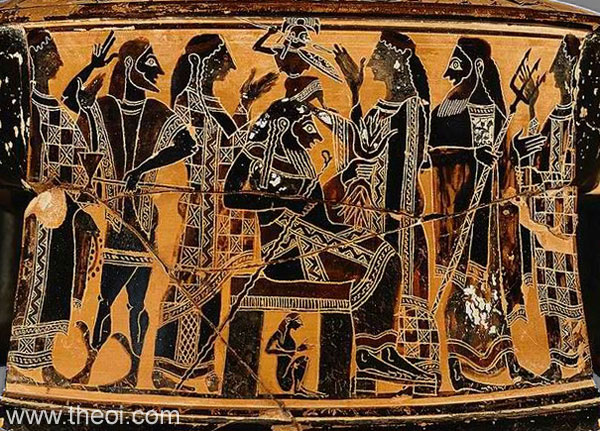
Homer, Iliad 11. 270 ff (trans. Lattimore) (Greek epic C8th B.C.) :
"The sharp sorrow of pain descends on a woman in labour, the bitterness that the hard Eileithyiai
(Eileithyiae, Spirits of Childbirth) bring on, Hera's daughters, who hold the power of the bitter
birthpangs."
Homer, Iliad 16. 187 ff :
"Eileithyia of the hard pains had brought out the child into the light, and he looked on the sun's
shining."
Pindar, Olympian Ode 6. 40 ff (trans. Conway) (Greek lyric C5th B.C.) :
"[Euadne (Evadne) pregnant with Apollon's child :] And she let fall her crimson girdle and bore a son,
inspired of heaven. And to serve at her side Apollon, god of the golden locks, sent Eileithyia the kindly
goddess, and the Moirai (Moirae, Fates) divine. And from her body's travail and the pains that were but sweet
delight, was born Iamos (Iamus)."
Pindar, Pythian Ode 3. 7 ff :
"His [Asklepios' (Asclepius')] mother [Koronis (Coronis)], daughter of Phlegyas the horseman, ere with the
help of Eileithyia, the nurse of childbirth, she could bring her babe to the light of day."
Pindar, Nemean Ode 7. 1 ff :
"Goddess of childbirth, Eileithyia, maid to the throne of the deep-thinking Moirai (Moirae, Fates), child
of all-powerful Hera, hear my song. For without thee should we see neither the light of day, nor know the kindly
dark, nor win the gift of Hebe, thy sister, the glorious limbs of youth."
Simonides, Fragment 166 (from Scholiast on Pindar) (trans. Campbell, Vol. Greek Lyric
II) (Greek lyric C6th to 5th B.C.) :
"Sogenes was born when his father Thearion was advanced in years and had made a prayer to the goddess, and
the boy's birth was as it were a favour on the part of Eileithyia. Because of the peculiar circumstances fo the
athlete's birth it was this goddess whom Pindar addressed."
Aristophanes, Lysistrata 742 ff (trans. O'Neill) (Greek comedy C5th to 4th B.C.)
:
"Oh! goddess divine, Eileithyia, patroness of women in labour, stay, stay the birth, till I have reached a
spot less hallowed than Athene's mount [the Akropolis (Acropolis)]!"
Herodotus, Histories 4. 35. 1 (trans. Godley) (Greek historian C5th B.C.)
:
"The Delians relate that two virgins, Arge and Opis, came from the Hyperboreans by way of the aforesaid
peoples to Delos earlier than Hyperokhe (Hyperoche) and Laodike (Laodice); these latter came to bring to
Eileithyia the tribute which they had agreed to pay for easing child-bearing."
[N.B. Eileithyia is here identified with Artemis.]
Plato, Laws 783e (trans. Bury) (Greek philosopher C4th B.C.) :
"[In Plato's ideal city the overseers of procreation meet in the temple of Eileithyia :] The bridegroom,
therefore, shall apply his mind both to the bride and to the work of procreation, and the bride shall do
likewise, especially during the period when they have no children yet born. In charge of them there shall be the
women-inspectors whom we have chosen . . . and they shall meet every day at the temple of Eileithyia, for a
third of an hour, or more; and at their meetings they shall report to one another any case they may have noticed
where any man or woman of the procreative age is devoting his attention to other things instead of to the rules
ordained at the marriage sacrifices and ceremonies."
Callimachus, Hymn 1 to Zeus 12 ff (trans. Mair) (Greek poet C3rd B.C.) :
"Thence is the place holy [where Zeus was born], and nor fourfooted thing that hath need of Eileithyia
(Childbirth) nor any woman approacheth thereto."
Callimachus, Hymn 6 to Demeter 130 ff :
"But those that are heavy [pregnant] and she that stretches her hand to Eileithyia."
Callimachus, Epigrams 54 (from A.P. 6. 146) :
"Eileithyia, come thou when Kykainis (Cycaenis) calls, to bless her pains with easy birth."
Callimachus, Aetia Fragment 7 (trans. Trypanis) (Greek poet C3rd B.C.) :
"Naked as with the goodwill of Eileithyia you came forth from your mother's womb."
Callimachus, Fragment 524 :
"Having seen Einatie [Eiliethyia], her [Hebe's] sister, while in labour."
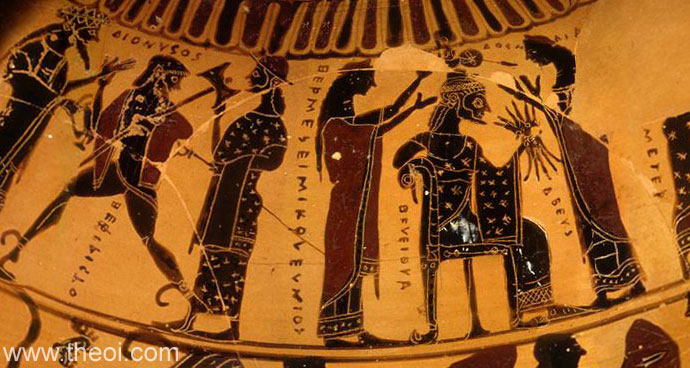
Diodorus Siculus, Library of History 5. 72. 5 (trans. Oldfather) (Greek historian
C1st B.C.) :
"To Zeus also were born, they say, the goddesses . . . Eileithyia and her helper Artemis . . . Eileithyia
received [assigned by Zeus and Hera] the care of expectant mothers and the alleviation of the travail of
childbirth; and for this reason women when they are in perils of this nature call first of all upon this
goddess."
Pausanias, Description of Greece 8. 32. 4 (trans. Jones) (Greek travelogue C2nd A.D.)
:
"Eileithyia he [Homer] says in the Iliad cares for the pangs of women."
Orphic Hymn 2 to Prothyraea (trans. Taylor) (Greek hymns C3rd B.C. to 2nd A.D.)
:
"When racked with labour pangs, and sore distressed the sex invoke thee [Artemis Eileithyia], as the soul's
sure rest; for thou Eileithyia alone canst give relief to pain, which art attempts to ease, but tries in vain.
Artemis Eileithyia, venerable power, who bringest relief in labour's dreadful hour."
Aelian, On Animals 7. 15 (trans. Scholfield) (Greek natural history C2nd A.D.)
:
"O Artemis of the child-bed, and ye Eileithyiai (Eileithyiae, Goddesses of Birth), daughters of Hera."
Oppian, Halieutica 1. 476 ff (trans. Mair) (Greek poet C3rd A.D.) :
"In spring the Eileithyiai (Eileithyiae, Birth-goddesses) deliver most part of the fishes from the heavy
travail of spawning . . . not even on the fishes have the Moirai (Moirae, Fates) bestowed easy birth, and not
alone to women upon earth are there pains, but everywhere the birth-pangs are grievous."
Anonymous (perhaps Pamprepius of Panopolis), Fragments (trans. Page, Vol. Select
Papyri III, No. 140) (Greek poetry C4th A.D.) :
"There a bridal shower of Erotes (Love-Gods) in the guise of rain, pouring their wedding-gifts upon the
couch of Mother Earth (gaiê), embraces the fertile furrow with hope of lucky ploughing. A
herdsman, near the mountain-stables, expecting a hailstorm from the clouds, propitious harbinger of
Eilithyeiê (Eileithyia) a goddess that brings rain to birth, drives heifers lately relaxed from the pangs
of travail to a dry resting-place high up among the crags."
[N.B. Here Eileithyia is associated with the birth of rain--a reference to the storm-cloaked bridal of her
parents Zeus and Hera, cf. Homer's Iliad 14.346.]
Nonnus, Dionysiaca 8. 402 ff (trans. Rouse) (Greek epic C5th A.D.) :
"Semele [consumed in the fire of Zeus lightning] saw her fiery end, and perished rejoicing in a
childbearing death [the baby Dionysos]. In one bridal chamber could be seen Himeros (Desire), Eileithyia, and
the Erinyes (Avengers) together. So the babe half-grown, and his limbs washed with heavenly fire, was carried by
Hermes to his father for the lying-in."
Nonnus, Dionysiaca 48. 794 ff :
"She [Aura] hated Artemis and would not call upon her in her pains; she would not have the daughters of
Hera [the Eileithyiai], lest they as being children of Bakkhos' (Bacchus') stepmother should oppress her
delivery with more pain."
GENETYLLIS GODDESS OF PROCREATION
Eileithyia under the name Genetyllis was also regarded as the goddess of procreation : sexual intercourse for the purpose of producing offspring. In this role she was associated with Aphrodite and the gods of marriage.
Aristophanes,Clouds 52 ff (trans. O'Neill) (Greek comedy C5th to 4th B.C.)
:
"When I married her, I lay with her redolent of new wine . . . but she, on the contrary, of ointment,
saffron, wanton-kisses, extravagance, gluttony, and of Kolias (Colias) [Aphrodite] and Genetyllis
[Eileithyia]."
Aristophanes, Thesmophoriazusae 130 ff :
"Oh! ye venerable Genetyllides, what tender and voluptuous songs! They surpass the most lascivious kisses
in sweetness; I feel a thrill of delight pass up me as I listen to them."
Suidas s.v. Genetyllis (trans. Suda On Line) (Byzantine Greek lexicon C10th A.D.)
:
"Genetyllis : A spirit associated with Aphrodite, responsible for procreation, taking its name from the
procreation (genesis) of children. The name is created from genesis. But others say that [they
are] associated with Artemis as guardians of childbirth, and again [this is connected] with genesis.
Aristophanes [writes] : ‘Sweet is the song, o ladies, Gentetyllides, and female and tongued and
tongue-kissed.’"
LUCINA GODDESS OF CHILDBIRTH (LATIN)
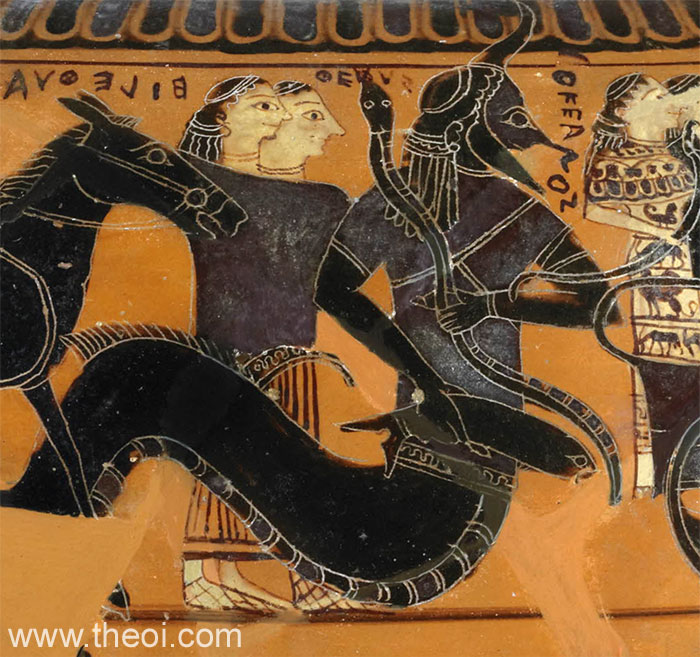
Ovid, Metamorphoses 5. 303 ff (trans. Melville) (Roman epic C1st B.C. to C1st A.D.)
:
"Their [the nine Peirides'] mother was Euippe Paeonis. To her aid nine times she called Lucina [Eileithyia]
and nine times she bore a child."
Ovid, Metamorphoses 10. 504 ff :
"The child [Adonis] conceived in sin had grown inside the wood [i.e. his pregnant mother Myrrha had been
transformed into a tree by the gods] and now was searching for some way to leave its mother and thrust forth.
Her trunk swelled in the middle with its burdened womb. The load was straining, but the pains of birth could
find no words, nor voice in travail call Lucina [Eileithyia]. Yet the tree, in labour, stooped with groan on
groan and wet with falling tears. Then, pitying Lucina stood beside the branches in their pain and laid her
hands upon them and pronounced the words of birth. The tree split open and the sundered bark yielded its living
load; a baby boy squalled, and the Naides laid him on soft grass and bathed him in his mother's flowing tears
[myrrh]."
Ovid, Heroides 6. 121 ff (trans. Showerman) (Roman poetry C1st B.C. to C1st A.D.)
:
"I am happy in the number, too, for by Lucina's [Eileithyia's] kindly favour I have brought forth twin
offspring, a pledge for each of us."
Ovid, Heroides 11. 45 ff :
"For the tenth time Luna [Selene the moon] was driving on her light-bearing steeds. I knew not what caused
the sudden pangs in me . . . The pains compel my groans, but fear, the nurse, and shame itself forbid. I repress
my groans, and try to take back the words that slip from me, and force myself to drink my very tears. Death was
before my eyes; and Lucina [Eileithyia] denied her aid [i.e. in easing the birth]."
Seneca, Medea 56 ff (trans. Miller) (Roman tragedy C1st A.D.) :
"[A wedding hymn or epithalamium or hymenaeus :] May the high gods who rule over heaven,
and thy who rule the sea, with gracious divinity attend on our princes' marriage, amid the people's solemn
applause. First to the sceptre-bearing Thunderers [Zeus and Hera] let the bull with white-shining hide offer his
high-raised neck. Lucina [Eileithyia] let a heifer appease, snow-white, untouched by the yoke; and let her
[Aphrodite] . . . be given a tender victim. And do thou [Hymenaeus], who the torches of lawful marriage
attendest . . . hither come."
[N.B. Eileithyia was invoked as one of the Theoi Gamelioi (Gods of Marriage) at the wedding ceremony,
to ensure a fruitful union.]
Statius, Thebaid 3. 158 ff (trans. Mozley) (Roman epic C1st A.D.) :
"[A grieving mother laments :] ‘How happy in their union are those whose chamber is barren, whose
house Lucina [Eileithyia] never visited at the cry of travail! Nay, to me my labour hath brought but
sorrow.’"
Statius, Achilleid 1. 672 ff :
"The swelling womb and the burden of the months of ailing . . . Lucina [Eileithyia] brought round by token
the appointed season, her course now fully run, and gave deliverance of her child."
Statius, Silvae 1. 2. 267 ff (trans. Mozley) (Roman poetry C1st A.D.) :
"May merciful Cynthia [Selene the Moon] hasten the tenth month for the bringing-forth [childbirth], but
spare her, Lucina [Eileithyia], I pray thee; and thou, O babe, spare thy mother, hurt not her tender womb and
swelling breasts."
Statius, Silvae 3. 3. 121 ff :
"Children too were nigh at hand; twice was Lucina [Eileithyia] present at the birth and deftly with
fruitful hand eased the pain of travail."
Statius, Silvae 4. 8. 22 ff :
"[Her husband] had given thee the glad privilege of triple offspring. Thrice has Lucina [Eileithyia] come,
and again and yet again visited thy dutiful home."
SACRED ANIMALS OF EILEITHYIA
The ichneumon or polecat (a type of weasel) was the sacred animal of Eileithyia. The creature was kept as a house pet to rid the dwelling of rodents and snakes and was believed to give birth through its mouth--a misconception which arose from the fact that the animal carries its young around inside its mouth.
Aelian, On Animals 10. 47 (trans. Scholfield) (Greek natural history C2nd A.D.)
:
"The Ichneumon is both male and female in the same individual, partaking of both sexes, and nature has
enabled each single same animal both to procreate and to give birth . . . Ichneumons are said to be sacred to
Leto and the Eileithyiai (Eileithyiae, Goddesses of Birth), and the people of Herakleopolis (Heracleapolis) [an
Egyptian city] worship them, so they say."
For the transformation of Galinthias into a weasel see Eleithyia, Galinthias & the Birth of Heracles (above)
ANCIENT GREEK ART
SOURCES (ALL EILEITHYIA PAGES)
GREEK
- Homer, The Iliad - Greek Epic C8th B.C.
- Homer, The Odyssey - Greek Epic C8th B.C.
- Hesiod, Theogony - Greek Epic C8th - 7th B.C.
- The Homeric Hymns - Greek Epic C8th - 4th B.C.
- Pindar, Odes - Greek Lyric C5th B.C.
- Greek Lyric III Simonides, Fragments - Greek Lyric C6th - 5th B.C.
- Aristophanes, Clouds - Greek Comedy C5th - 4th B.C.
- Aristophanes, Lysistrata - Greek Comedy C5th - 4th B.C.
- Aristophanes, Thesmophoriazusae - Greek Comedy C5th - 4th B.C.
- Herodotus, Histories - Greek History C5th B.C.
- Plato, Laws - Greek Philosophy C4th B.C.
- Apollodorus, The Library - Greek Mythography C2nd A.D.
- Callimachus, Hymns - Greek Poetry C3rd B.C.
- Callimachus, Fragments - Greek Poetry C3rd B.C.
- Diodorus Siculus, The Library of History - Greek History C1st B.C.
- Strabo, Geography - Greek Geography C1st B.C. - C1st A.D.
- Pausanias, Description of Greece - Greek Travelogue C2nd A.D.
- The Orphic Hymns - Greek Hymns C3rd B.C. - C2nd A.D.
- Antoninus Liberalis, Metamorphoses - Greek Mythography C2nd A.D.
- Aelian, On Animals - Greek Natural History C2nd - 3rd A.D.
- Oppian, Cynegetica - Greek Poetry C3rd A.D.
- Nonnus, Dionysiaca - Greek Epic C5th A.D.
- Greek Papyri III Anonymous, Fragments - Greek Poetry C4th A.D.
ROMAN
- Hyginus, Fabulae - Latin Mythography C2nd A.D.
- Ovid, Metamorphoses - Latin Epic C1st B.C. - C1st A.D.
- Ovid, Heroides - Latin Poetry C1st B.C. - C1st A.D.
- Cicero, De Natura Deorum - Latin Rhetoric C1st B.C.
- Seneca, Medea - Latin Tragedy C1st A.D.
- Statius, Thebaid - Latin Epic C1st A.D.
- Statius, Achilleid - Latin Epic C1st A.D.
- Statius, Silvae - Latin Poetry C1st A.D.
BYZANTINE
- Suidas, The Suda - Byzantine Greek Lexicon C10th A.D.
OTHER SOURCES
Other references not currently quoted here: Nonnos Dionysiaca 25.41, Plutarch Roman Questions 49, Ovid Amores 2.13, Catullus 34.13, Dionysius of Halicarnassus Roman Antiquities 4.15, Lucian Pseudol. 11.
BIBLIOGRAPHY
A complete bibliography of the translations quoted on this page.
